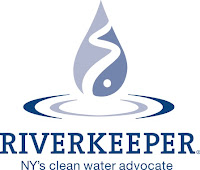Capital to Capital Canoe Expedition presentation in Yonkers
on Saturday, September 29
1,000 mile Canadian and American canoe
expedition advocates for clean, healthy rivers
Meet the 10 intrepid
Canadian and American canoeists who are paddling over 1,000 miles from Ottawa,
Ontario, to Washington, DC, in a 36-foot voyageur canoe. They’ll be joined by a
rotating shift of locals along the way: Lenore Person, a Dobbs Ferry resident
and Director of Development with Beczak Environmental Education Center, will
paddle with them on the Hudson River.
The Capital to Capital Canoe Expedition RiverTalks presentation will share adventures
and images from the Ottawa River to the St. Lawrence Seaway, Lake Champlain,
the Champlain Canal and the Hudson River. Participants will learn about
Canada’s approach to the problems their waterways face, and discuss what the
paddlers have discovered from local residents and organizations about the
waterways on which they travel.
“This is the dream,” says team leader and long
distance paddler Max Finkelstein. “That our two countries work together to
transcend political borders to protect and restore our rivers.” To symbolize this idea, their cargo
includes a bottle of Ottawa River water from the foot of the
parliament buildings, to be mixed with the waters of the Potomac in Washington.
The Capital to Capital Canoe Expedition’s
call for clean water is timely. Earlier this year, New
York State Supreme Court Justice Joan Lefkowitz ruled that the Department of
Environmental Conservation’s permit system failed to meet a federal mandate to
protect the waters. “It is probably one of the most significant threats to
water quality that we have today,” Kate Hudson, watershed program director with
Riverkeeper, said of stormwater runoff. Eight environmental groups, including
the Hudson Riverkeeper and the Long Island Soundkeeper, are locked in a battle
with New York State, charging that a stormwater system permit that
municipalities must sign onto fails to do enough to ensure that oils,
fertilizer, animal feces and other pollutants are stopped on their way.
The Capital to Capital team includes Max
Finkelstein from Ottawa, a long distance paddler and author of Canoeing a
Continent; Nicholas Tilgner, a Yukon
River Guide, Dot Bonnenfant, long
distance paddler and artist, and Willis
Elkins, trip leader/canoe instructor for the North Brooklyn Boat Club. Lenore
Person, Beczak’s Director of Development, will be joining them for the Hudson
River leg, paddling from Beacon to Yonkers.
The Capital to Capital Canoe Expedition is
supported by the Canadian Wildlife Fund, and offered hospitality by Riverkeepers
along the way. Canadian groups include Ottawa Riverkeeper, Canadian Heritage
Rivers System, and Canadian Canoe Foundation; Hudson River groups including Hudson
Riverkeeper, Hudson River Watertrail Association, Hudson River Valley Greenway,
Yonkers Paddling and Rowing Club, and Beczak Environmental Education Center;
and mid-Atlantic groups including Delaware Riverkeeper Network, Raritan
Riverkeeper and Potomac Riverkeeper.






+300dpi.JPG)




















